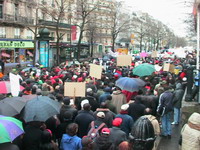No politicians from political opposition boycott parliamentary election in Togo
Togolese voters in Sunday's parliamentary election were handed the longest ballot sheets they had seen in more than a decade.

For the first time in several years, no politicians from the political opposition were boycotting a parliamentary election in the West African nation, which has been ruled by one family since shortly after gaining independence from France in 1960.
Major opposition parties refused to participate in legislative elections in 1999 and 2002 over charges that the ruling party was rigging the vote.
On Sunday, long, winding lines quickly formed under a bright morning sun. About 3,000 people waited outside one polling station.
Military ruler Gnassingbe Eyadema controlled Togo from 1967 until his death in 2005, when his son, Faure Gnassingbe, seized power. He won elections held a few months later under international pressure - the country's last election before Sunday's legislative poll.
The opposition had claimed victory in that vote and riots broke out. Days of violent clashes left hundreds dead, and tens of thousands of Togolese fled into neighboring Benin and Ghana to escape the violence, according to U.N. agencies.
Some Togolese said the years of opposition boycotts had born fruit.
"The boycotts gave the opposition the chance to force the late President Eyadema to start with political reforms," local radio reporter Guy Yovo said after casting his vote.
Significant international aid is also at stake for the impoverished country. The European Union, which cut funding to Togo in 1993 over concerns about its totalitarian government, has since resumed some aid but has said it is looking to this vote as a measure of Togo's democracy as it decides whether to restore full funding.
International observers were on hand from the European Union, the association of the world's French-speaking countries and the 15-member Economic Community of West African States.
More than 2,000 candidates were running for 81 seats, according to the electoral commission. Seventy-two of the seats had been held by the ruling Rally of the Togolese People, according to a parliament spokesman.
A power-sharing government organized the vote under an August 2006 deal that set up an independent electoral commission and put an opposition leader in the post of prime minister.
Originally scheduled for June, the vote was delayed twice by disputes over the issuing of voter cards and protocol for the approximately 5,000 polling stations.
The president called the election the beginning of a great reform.
"I believe that this will be the democratic rebirth of the Togolese people. If there are still skeptics, I will do everything to convince them," Gnassingbe said after voting at a primary school in a military camp. His short speech was broadcast on national television.
Togo has spent the past month dealing with massive flooding in the north after a heavy rainy season. According to U.N. groups, 30,000 homes were destroyed, along with a season's crops.
About 2.9 million of Togo's 5 million people were registered to vote. Electoral officials said they had been working to ensure that those displaced by the flooding would still be able to vote. Many are being housed in the same schools that are being used as polling centers.
Polls were set to close at 5 p.m., but many stayed open an hour or more later to allow those still waiting in line to vote. Results were expected to start coming in late Monday, though it could be many more days before winners are announced.
Subscribe to Pravda.Ru Telegram channel, Facebook, RSS!


